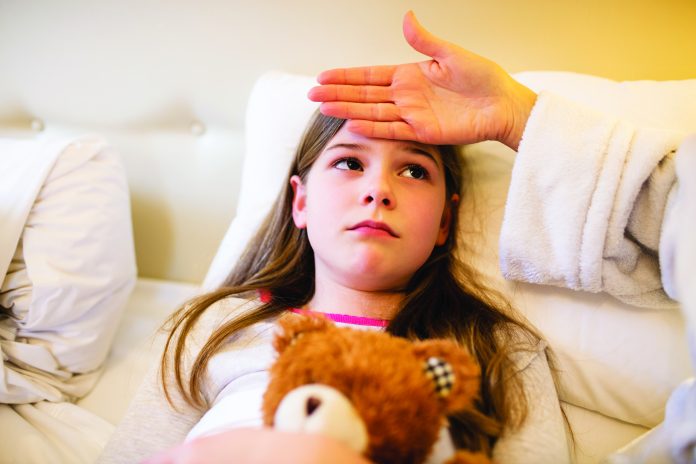Bronchiolitis is an infection caused by a virus. It affects the lower part of the lungs. Bronchiolitis is common in babies, but it can happen in children up to age two. Bronchiolitis makes the small airways that carry air to the lungs (bronchioles) swell and make more mucous. The bronchioles become narrow, which causes wheezing, lots of coughing, and trouble breathing.
What Causes It?
The most common virus that causes bronchiolitis is RSV (respiratory syncytial virus). Your child can get an RSV infection more than once. In older children and adults, RSV causes a common cold rather than bronchiolitis.
What are the Symptoms?
At first, your child may have common cold symptoms such as:
- A runny nose
- A mild cough
- A fever
- Low energy
- Eating less than normal
About one to three days after cold symptoms start, the infection can cause bronchiolitis symptoms such as:
- A cough that’s getting worse
- Lots of coughing
- Wheezing
- Fast breathing
- Indrawing (when the skin gets sucked in at the neck, collarbones, or between the ribs with each breath)
- Throwing up after coughing
- Trouble feeding (breast or bottle), especially for babies younger than six months
- Fewer wet diapers
Bronchiolitis can be more serious in some children, especially if they:
- Were born early (premature, before 34 weeks)
- Are younger than 3 months
- Have a history of asthma or lung problems
- Have a history of heart problems
Take your child to a doctor if they have any symptoms of bronchiolitis.
How is it Diagnosed?
A doctor may diagnose bronchiolitis by asking for your child’s medical history and checking their symptoms. Your child probably won’t need tests if they have typical bronchiolitis symptoms.
How is Bronchiolitis Treated?
Bronchiolitis happens the same way in most children. Symptoms tend to get worse until day four or five, and then they slowly get better. Most children feel better in one to two weeks. Some children have a cough that lasts a few weeks. If your child has bronchiolitis, you can usually take care of them at home. There is no medicine for bronchiolitis. Antibiotics do not work because bronchiolitis is caused by a virus.
Care at Home
Coughing
- Keep your child sitting or propped up instead of lying down, because it’s easier to breathe in this position. A cool-mist humidifier in your child’s room can help with their cough. Follow the directions for using the humidifier and keep it out of reach of children.
- Cough medicine isn’t good for young children. Do not give cough medicine to children younger than six years.
Stuffy Nose
- Clean out your child’s nose to make breathing and feeding easier.
- Try saltwater nose sprays to help loosen mucous in the nose. Spray or drop salt water into each nostril then suck out the mucous with a nasal aspirator. Talk to your pharmacist to find the right products for your child. Don’t make your own saltwater solution at home.
- Clean your child’s nose before feeds and bedtime, and as often as they need during the day.
Eating and Drinking
- Encourage your child to drink fluids. Your child may not want to drink like they usually do but keep offering small amounts of fluids throughout the day so that they stay hydrated.
- Babies younger than six months should continue to feed (breast or bottle) as usual. Keep track of how many wet diapers they make.
- Your child may not want to eat food when they’re sick, and that’s okay.
Fever and Discomfort
- You may give acetaminophen (Tylenol or Tempra) or ibuprofen (Advil or Motrin) to keep your child comfortable. Follow the directions on the package or the directions from your healthcare provider.
- Do not give aspirin to anyone younger than 18 years because of the risk of Reye syndrome, a serious illness.
How Can You Prevent It?
Bronchiolitis spreads easily through close contact with someone who’s sick and is coughing or sneezing around you. Touching toys or sharing food with someone who’s sick can spread the virus. Children with bronchiolitis are contagious for almost a week after they first get sick. Keep your child at home if they’re coughing a lot. To prevent bronchiolitis:
- If your child has bronchiolitis, keep them at home until they feel better.
- Keep a child with bronchiolitis away from young babies (under three months).
- Wash your hands often to stop the virus from spreading. Teach your child to wash their hands before and after eating, coughing, or sneezing.
- Don’t smoke, use other tobacco products, or vape around your child. Second-hand smoke can put children at higher risk of infections.










